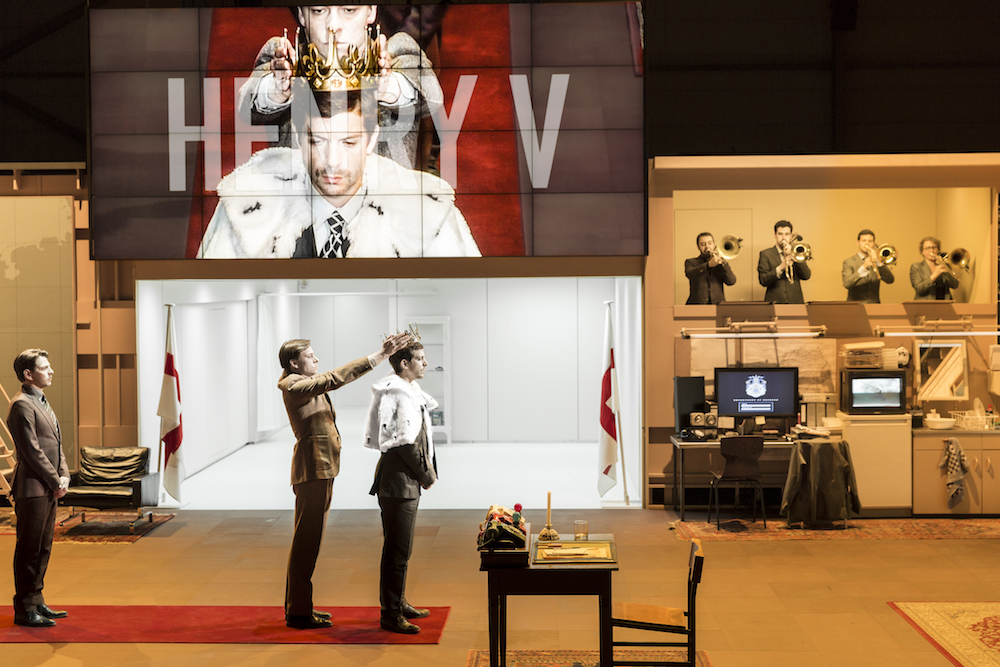King Henry V delivers his famous exhortation “Once more unto the breach” staring straight into the camera. Each line is slow and deliberate, the King reading from a paper at his desk – this is real “My fellow Americans” stuff. His speech concluded, he folds up his paper with a quiet dignity, before suddenly changing his mind and going ‘off script’. “Dishonour not your mothers,” becomes a wild, furious (and, dare I say it, unpresidential) rant, Henry practically foaming at the mouth as he threatens to leap through the television screen above the Festival Theatre stage.
Belgian theatre director Ivo van Hove’s Kings of War – an amalgamation of Shakespeare’s Henry V, Henry VI Parts 1–3 and Richard III (with snippets of Henry IV and VII to top and tail) – opened in New York in 2016 against the backdrop of Donald Trump’s election win, and commentators were quick to draw parallels. But Van Hove – whose six-hour Roman Tragedies, also with Toneelgroep Amsterdam, stunned the Adelaide Festival in 2014 – uses Shakespeare’s three kings to explore more universal ideas of leadership and power. Indeed, when Kings of War opened in London in 2015, The Guardian’s reviewer Lyn Gardner saw parallels with Tony Blair and George Bush.
 Ivo van Hove’s Kings of War
Ivo van Hove’s Kings of War
By combining the five plays into a single, four-and-a-half hour long epic, Van Hove steadily narrows the focus from the outward-facing party-boy turned soldier-king Henry V, to the internal squabbles of the English under the ineffectual reign of Henry VI and finally, in the second half, to the inner workings of an ambitious and narcissistic Richard III, in an examination of three very different kinds of male leadership.
This dizzyingly multi-faceted production draws on genres from thriller to reality television, setting the first act, Henry V, in a wood-panelled Churchillian map room complete with red telephone. Ramsey Nasr is a reluctant then fierce Henry V (he is later Henry VII as the wheel comes full circle), wielding propaganda machine as deftly as sword in a set that sees a hand-held camera follow leaders through white corridors behind the stage, projecting close-up images of faces – not to mention revealing otherwise obscured casualties of political machinations – to the audience in the theatre.
With Shakespeare’s text pared right back and translated into Dutch by Rob Kilnkenburg (delivered to the audience in English surtitles), we lose much of the poetry of Shakespeare’s language. To condense the five plays, a lot has to be stripped out – Joan of Arc, John Cade and countless other characters are cut, as is most of the banter and word-play, leaving only material that speaks directly of the Kings themselves. While there are a couple of moments when the timeline skips forward a little joltingly (particularly in the three parts of Henry VI) this is overall a remarkably smooth and streamlined telling.
Eelco Smits’ Henry VI isn’t so much distracted by spiritual pursuits as he is paralysed and overwhelmed by the pressures of the job – we see his contorting face up close as the English nobles, and his queen Margaret (Janni Goslinga), fight for power while he cowers in his pyjamas, the set now more living room than war room.
By the time Richard III – in a wonderful performance by Hans Kesting, his face coloured by a birthmark, his hunch softened under his suit – is clawing his way to power, the set has become more domestic still, bedecked with plants and wall-hangings. Television screens and mirrors are interchangeable, and while each king is drawn to the mirror, it is Richard who basks in his reflection with the most relish. Richard III is granted the most weight and time in this epic, giving the saga an odd sense of balance – it could almost exist as a production on its own – after the aggressively streamlined earlier plays. We feel the stretching isolation (drilled home by a relentlessly ticking metronome) of a leader who has fought bitterly to get to the top, but with no idea of what to do once he gets there.
There are some lighter moments, however – the ‘diplomatic incident’ between Henry V and the French ambassador (Chris Nietvelt) is a highlight, while his dinner with prospective queen Katharina (Hélène Devos) is spectacularly awkward. Richard III gets some laughs from the knowing looks he shares with the audience in the final act (though this gentle piercing of the fourth wall feels at odds with the earlier, less overtly self-aware material).
Kings of War is a stark and brutal portrayal of ambition and leadership across the ages, brought to life with inventive staging and limned with a beautifully dark score delivered by countertenor Steve Dugardin and on-stage trombone quartet BL!NDMAN. While this is a vast, sprawling epic, it captivates as much in its finely-honed details, Ivo van Hove carefully crafting an immersive aesthetic that’s compelling to the end.
Kings of War plays at the Adelaide Festival Centre as part of the Adelaide Festival until March 13











Comments
Log in to join the conversation.